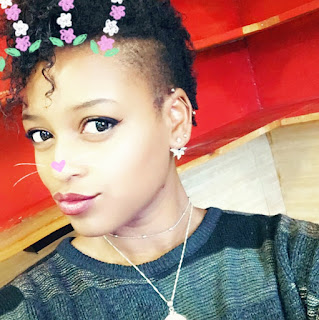A long time ago, no one looked at the Moon. She was plain, a big white orb hanging in the sky. Smooth, unblemished, and uninteresting. She guided war and merchant ships at sea, illuminated children playing games at night, and provided light for lovers, kissing in the dark. She was a tool, but she was vain and she wanted to be called beautiful.
There was also an unhappy girl. People stared at her as she passed them in the roads, because she had some parts of her skin which were lighter than others. They were on her hands and feet, like gloves and socks; they were on her chest and shoulders, like battle armor. There was even a large white patch splashed across her face. The others called her the "the girl with the patchwork face;" she did not think she was beautiful.
One day, the Moon heard crying. She looked for the source of the sound and found the girl hiding in the woods. The Moon looked upon her with pity and interest.
"Why do you weep, girl?" the Moon said.
"I weep because I am hideous!" the girl cried, and tears streaked down her face. She dared not cry in town, among the people. But alone in the woods, she let her tears flow freely and without shame.
But the girl did not know that she was not alone. A boy from the village had followed her through the trees. He watched her sob with a leaden heart, for he loved the girl with the patchwork face, and it pained him deeply to see her sorrow.
The Moon said to the girl, "Come. Come and live with me in the sky. For I am plain, but you are beautiful. Men will look up not to see when to plant, or when the tides will rise, but to admire how lovely we are."
But the girl would not be cheered, and said "No, Moon. If you want to be lovely then I must stay away, down here on Earth. I cannot make you beautiful."
The boy walked out from betwixt the trees and approached the girl in the wood.
"You must go with the Moon," he said. "For I think you are the most beautiful girl, and all should see you as I see you. Tell us how to reach you, Moon, and I will see to it that she joins you in the sky."
The Moon was elated. "Find the tallest tree in the forest and climb it. I will guide you. I will take you in my arms and kiss you, and the sky will become your home."
The girl was afraid, but she took the boy's hand and together they ran through the woods, following the light of the Moon.
Finally, they came upon the tallest tree, shining brightly in the night. They began to climb, and as they did the girl's heart lightened. The boy pulled her up when she stumbled; sometimes, in her excitement, she went ahead of him. They climbed and climbed, higher and higher, until the air was thin and they were amongst the stars.
The Moon was directly above them, now. The girl stretched and reached as far as she could, but she was still too far away. The boy braced himself and balanced carefully upon the treetop before lifting the girl high overhead, until the Moon could kiss her patchwork face.
As soon as the Moon's lips touched the girl's forehead, she vanished.
The boy scrambled down the tree, scratching himself on twigs and on branches. He ran through the forest, back to the village, without stopping. When he had returned home, he told everyone in the village to look at the Moon's new face and see how beautiful she was.
The villagers were skeptical because everyone knew that the moon was plain, but when they turned to see her they all stared in awe and silence. The villagers looked upon her dips and curves, her mountains and seas, her dark patches and bright spaces and said, "How beautiful she is."
And the moon and the girl were happy.
Author's Note:
I was inspired by the "Origins" stories in the Mythology-Folklore Anthology. I liked how both stories sort of gave an explanation for the images we create out of the shapes on the moon's surface. I wanted to do a similar story.
Bibliography:
Eastern Stories and Legends by Marie L. Shedlock (1920).
"The Man in the Moon" from Laos Folk-lore by Katherine Neville Fleeson.
















